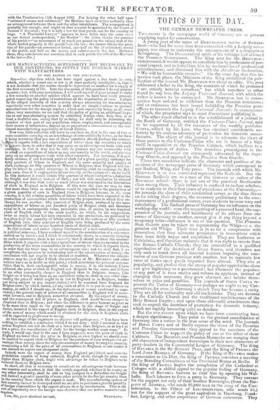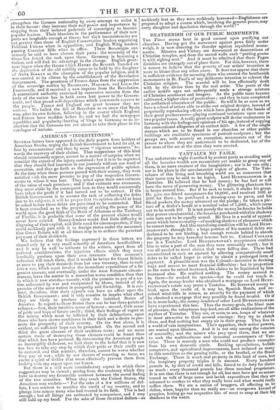TOPICS OF THE DAY.
THE GERMAN NEWSPAPER PRESS.
Two events in the newspaper world of Germany are at present supplying topics for conversation.
A young poet of the name of HeRwzon—a native of Switzer-
land—who had for some time been connected with a Leipzig news- paper, was about to undertake the management of a newspaper at Konigsberg. The Democratical spirit of his writings had alarmed the Prussian Government. The King sent for Mr. HERWEGII ; endeavoured, it would appear, to conciliate him by professions of per- sonal respect, and to intimidate him by declarations of professional relentlessness ; and dismissed him with the chivalrous declaration, " We will be honourable enemies." On the same day that this in- terview took place, the Ministers of the King prohibited the pub- lication of the journal Mr. HERWEGII was about to edite. The poet addressed a letter to the King, the contents of which he professed " are strictly betwixt ourselves," but which somehow or other found its way into the Leipzig Universal Journal, with which the writer is known to be connected. Mr. IIERwEGii has in conse- quence been ordered to withdraw from the Prussian dominions ; and an ordinance has been issued forbidding the Prussian post- offices to transmit the Leipzig Universal Journal; in consequence of which, the proprietor says he must discontinue publishing it.
The other event alluded to is the establishment of a journal in
the South of Germany, entitled the Customs- Union Journal, said to be supported by all the resources of the wealthy publisher COTTA, edited by Mr. LIST, who has obtained considerable no- toriety by his zealous advocacy of protection for domestic manu- factures. The object of this journal is to advocate the views of those parties to the Customs-Union who are in favour of a high tariff, in opposition to the Prussian Cabinet, which inclines to a moderate system of duties. The doctrines promulgated in the Customs-Union Journal are strenuously advocated by the Augs- burg Gazette, and opposed by the Prussian State Gazette.
These two anecdotes indicate the character and position of the
sections of the newspaper press of Germany which correspond to our Radical, Whig, and Tory press. The journals with which Mr. HERWEGII is or was connected represent the Radicals. But the German Radicals are to a man of the GODWIN or rather of the ROUSSEAU school : there is not one of the practical Benthamite class among them. Their influence is confined to recluse scholars, or to students in their first years of attendance at the University,— for towards the close of their academical career, as the time draws on for taking their degrees, the necessary preliminary to the com- mencement of a professional career, even students become wary and calculating. The Radical press of Germany has no influence on the working-day world : even the coquetting of a crowned head, the sup- pression of its journals, and banishment of its editors from one corner of Germany to another, cannot give it any thing beyond a temporary eclat—influence is out of the question. The Prussian State Gazette may be taken as representing the Whigs—i. e. the genuine old Whigs. Their tone is in so far a compromise with innovation, that they advocate persistance in innovations which have been. fairly begun and established. They are Lutheran or Calvinistic, and therefore maintain that it was right to secede from the Roman Catholic Church ; they are committed to a qualified approbation of the doctrines of ADAM SMITH, and therefore not
only seek to break down all internal barriers impeding the com-
merce of one German province with another, but to maintain low rates of duties upon goods imported from abroad. They aim at popularity, and profess that the stamp of popular approbation alone can give legitimacy to a government ; but whenever the populace or any part of it runs restive and refuses its applause, instead of changing their measures, they grow alarmed, and betake them- selves to pains and penalties. The journals of Baron COTTA re- present the Tories of Germany—or perhaps we ought to say Con- servatives, for even in Germany a stanch Tory has become a rarity. They are all for nationality and old institutions. They are devoted to the Catholic Church and the traditional reminiscences of the Holy Roman Empire ; and upon these old-world attachments they seek to engraft the doctrines of protection for domestic industry, which are rapidly becoming quite as desolate.
But the two events upon which we have been commenting have
a deeper significancy. They point to the gradual consolidation of Germany into a nation in the true sense of the word. The journals of Baron COTTA and of Berlin express the views of the Bavarian and Prussian Governments : they appeal to the members of the Customs-Union to support the policy of one or the other of these Cabinets. The Bavarian and Prussian Monarchs are merging their old characters of independent Sovereigns in their new characters of party-leaders in the Commercial League of Germany. The King of BAVARIA is the Sir ROBERT PEEL, and the King of PRUSSIA the Lord JOHN RUSSELL of Germany. If the King of BAVARIA makes a concession to his Diet, the King of PaussiA convokes a meeting of the Standing Committees of the Provincial States at Berlin. if the King of Paessia begins the completion of the Cathedral at Cologne with a skilful appeal to the popular feeling of Germany, the King of BAVARIA hastens to rival him by opening his Wal- halla. Each labours to form a party in Germany. They canvaas for the support not only of their brother Sovereigns, (from the Em- peror of AUSTRIA, who sends 95,000 men to the army of the Con- federation, to the Prince of LIECHTENSTEIN, who sends 55,) but for the support of the great capitalists in Hamburg, Frank- fort, Leipzig, and other emporiums of German commerce. They strengthen the German nationality by every attempt to enlist it in their favour : they increase their real power and importance by stepping from their isolated pedestals of sovereignty to become popular leaders. Their blunders in the performance of their new parts are laughable enough at times ; but their inconsistencies are not greater than those of English Conservative leaders organizing Political Unions when in opposition, and English Whig leaders passing Coercion Bills when in office. These Sovereigns can scarcely be said to have chosen their parts: the necessity of the times has forced the task upon them. Germany is becoming a nation, and will find its advantage in the change. English great- ness began when the throne which HENRY the Seventh founded on the depression of the old nobility came to be held by the daughter of ANNE BOLEYN as the champion of the popular religion, and it was carried to its climax by the establishment of the Revolution Government. The greatness of France dates from the suppression of the sovereign nobles by RICHELIEU, Mazaars, and Louis the Fourteenth, and it received a new impetus from the Revolution. A centralized authority exercised by successive recruits from the body of the nation has in both cases lent power to the Govern- ment, and that proud self-dependence which commands success to the people. France and England are great because they are notions. We hailed the fall of Barcelona as an omen that Spain was, after its own fashion, following in the course which England and France have trodden before it; and we bail the newspaper squabbles and popularity-hunting of kings in Germany as an in- dication that the Germans too are about to take their place in the catalogue of nations.



























 Previous page
Previous page